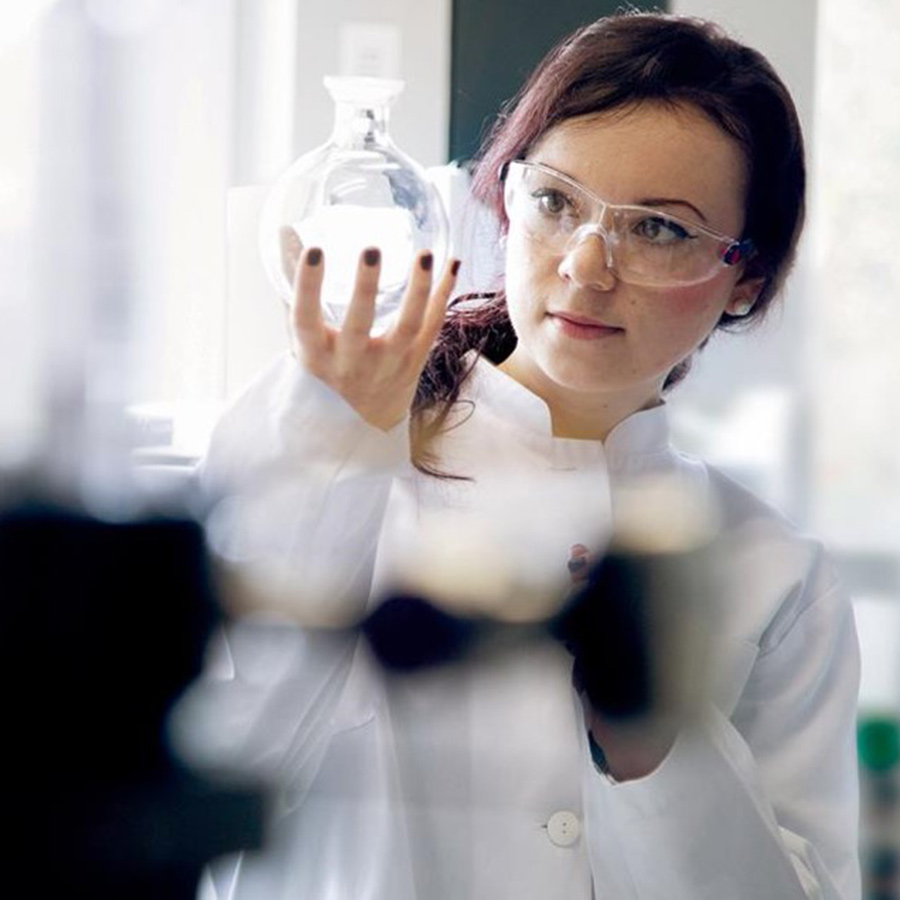Covid-19: Testmethoden im Kampf gegen das Virus
KNF Pumpen stellen eine wichtige Komponente in essenziellen Testverfahren dar.

Im Kampf gegen Covid-19 liegt die weltweite Hoffnung nicht nur in der Entwicklung eines Impfstoffs. Der Fokus liegt vor allem auch auf der Entwicklung und Optimierung von Testverfahren, um Infektionen nachweisen und Neuinfektionen vorbeugen zu können.
Südkorea gilt dabei als Paradebeispiel. Es hat die Ausbreitung des Virus innerhalb kurzer Zeit weitestgehend unter Kontrolle bekommen. Auch wenn das Zusammenspiel verschiedener Aspekte zu einer erfolgreichen Eindämmung geführt haben mag, werden umfangreiche Tests in der Bevölkerung als ein entscheidender Faktor gesehen. So konnten auch milde und asymptomatische Fälle früh erkannt und isoliert werden.
Es herrscht weltweit Einigkeit über die Wichtigkeit der Tests, um der Pandemie Herr zu werden. Doch, wie genau kann Sars-CoV-2 – das Virus, das die Covid-19-Krankheit auslöst – genau nachgewiesen werden? Und welche Art von Tests stehen der Medizin zur Verfügung?
Lesen Sie dazu mehr in dem nachfolgenden Artikel. Dort erfahren Sie außerdem, welche entscheidende Rolle KNF Pumpen bei den verschiedenen Testverfahren spielen.
PCR-Tests als Goldstandard zum Nachweis von Infektionen
Zum Nachweis von Covid-19 kommen in der Regel Nukleinsäure-Amplifikations-Technik-Tests zum Einsatz (NAT-Tests). Sie basieren auf der sogenannten PCR-Methode und können eine frische Infektion mit dem Virus zuverlässig nachweisen. Dazu wird bei den Patienten ein Rachen- oder Nasenabstrich durchgeführt. Alternativ wird Hustensekret aufgefangen, um eine Probe aus den tiefen Atemwegen zu erhalten. Anschließend wird die Probe im Labor auf das Erbgut des Virus untersucht. Beim Durchführen des Tests wird dabei mithilfe der Polymerasekettenreaktion (PCR) das Viruserbgut aus dem Abstrich gezielt vervielfältigt. So können selbst minimale Mengen des Virus erkannt werden.
Für die Amplifikation wird die Probe einer thermischen Wechselbelastung unterzogen, um den DNA-Strang zu spalten. Dieser Vorgang wird mehrmals wiederholt, um das Virus auffindbar zu machen. Jede Duplikation der DNA erfordert dabei einen thermischen Zyklus. Damit kann die Probe auf einer optimalen Temperatur gehalten werden. Dieser Prozess erfordert in der Regel eine Kühlmittelschleife, um die Probe zur Spaltung der DNA zu erhitzen oder um die Temperatur zu senken und die DNA-Stränge wieder zusammenzuführen.
Bei PCR-Tests verlassen sich einige der weltweit führenden Unternehmen der Medizinbranche auf KNF Membranpumpen, um schnelle und genaue Tests zu gewährleisten. Unter anderem kommen KNF Pumpen beim Waschen von Nadeln und Absaugen von Abfällen zum Einsatz.
Zweittests reizen Testkapazitäten aus
Trotz der hohen Zuverlässigkeit des PCR-Tests hängt das Ergebnis weitgehend von der Art und Weise und dem Zeitpunkt der Probenentnahme ab. So wird beispielsweise angenommen, dass das Covid-19-Virus in der ersten Krankheitswoche nur im Rachenraum nachweisbar ist, während es in der zweiten Woche in der Lungensekretion gemessen werden kann. Da die Inkubationszeit mindestens zehn Tage beträgt, besteht die Möglichkeit, dass eine Person, die vor einigen Tagen negativ getestet wurde, nun infiziert sein und das Virus weitergeben könnte. Patienten, bei denen ein starker Verdacht auf Covid-19 besteht, werden daher in der Regel nach einigen Tagen ein zweites Mal getestet.
Aufgrund der Notwendigkeit, Tests zu wiederholen (Länge pro Test: 3–4 Stunden), einer weltweit steigenden Nachfrage nach Tests und der wachsenden Zahl von Covid-19-Patienten kämpfen Länder weltweit bereits jetzt mit ihren Testkapazitäten.
Dennoch ist eine zuverlässige, umfangreiche und schnelle Diagnose von Infektionen entscheidend, um das Virus einzudämmen.
Schnelltests zum Erhöhen der Testkapazitäten
Um dem steigenden Bedarf and Tests nachzukommen, arbeiten Unternehmen weltweit daran, zuverlässige, schnelle Testmethoden für den Nachweis von Sars-CoV-2 zu entwickeln. Als eines von vielen Unternehmen stellt sich das Schweizer Pharmaunternehmen Roche der Herausforderung und kann bereits einen Erfolg verzeichnen: Die US-Gesundheitsbehörde FDA hat dem Cobas SARS-CoV-2-Test des Unternehmens eine Notfall-Zulassung erteilt. Auch in der Europäische Union ist der Test zugelassen.
Das vollautomatisierte Testsystem ermöglicht die Analyse von bis zu 4000 Proben täglich. Vorgänge wie die Probenvorbereitung, die Probenbeladung, sowie Nukleinsäure-Aufreinigung, Amplifikation und Detektion des genetischen Materials mittels Real-Time-PCR werden vollautomatisierten durchgeführt. Damit bietet das Cobas-System von Roche bis zu zehn Mal höhere Testkapazitäten als manuell durchgeführte PCR-Tests. Das Cobas-6800-System von Roche kann innerhalb von 24 Stunden 1440 Tests durchführen, während das Cobas-8800-System sogar bis 4128 Tests stemmt.
Antikörpertests als weiterer Eckpfeiler
Während der PCR-Test den Nachweis akuter Infektionen ermöglicht, lässt er keine Rückschlüsse darauf zu, wie viele Menschen in der Bevölkerung bereits einen Immunschutz aufgebaut haben. Antikörpertests sind deshalb ein weiterer wichtiger Eckpfeiler im Kampf gegen die Corona-Pandemie.
Nach aktuellem Forschungsstand weisen Patienten nach einer überwundenen Infektion mit Covid-19 für einen gewissen Zeitraum eine Immunität gegen das Virus auf. Dies gilt natürlich ebenso für Menschen, die das Virus hatten, aber wegen fehlender oder milder Symptomatik nie auf dieses getestet wurden. Das Wachstum dieser Personengruppe könnte einen entscheidenden Beitrag dazu leisten, dass die Kurve der derzeitigen Pandemie langsam abflacht. Das Wissen über die Immunität von medizinischem Personal würde es beispielsweise ermöglichen, sie im Krankenhaus bevorzugt in der Pflege von Covid-19-Patienten einzusetzen.
Um solche Rückschlüsse ziehen zu können, ist ein valider Antikörpertest Voraussetzung. Ein solcher Test ist der sogenannte ELISA-Test (Enzyme-Linked Immunosorbent Assay). Bei diesem wird eine geringe Menge Blut der Testperson auf den Gehalt bestimmter Antikörper untersucht. Dazu wird die Blutprobe auf ein Plastikplättchen mit rund 100 kleinen Löchern geträufelt. Die Menge von Antikörpern lässt sich anschließend anhand einer Farbreaktion ablesen: spezielles Licht lässt das Blut in einem gelben Farbton erscheinen. Je dunkler der Farbton, desto mehr Antikörper wurden gebildet.
KNF Membranpumpen haben sich seit Jahrzehnten als zuverlässige Komponenten bei der Blutanalyse bewährt. KNF Mikro-, Gas- und Flüssigkeitspumpen werden unter anderem zur Entgasung sowie zum sicheren Transfer von Proben von einem Prozess zum anderen eingesetzt. Unsere Pumpen zeichnen sich durch eine lange Lebensdauer und einen geringen Wartungsaufwand aus. Diese beiden Eigenschaften sind für die zuverlässige Durchführung einer Vielzahl von Tests über einen langen Zeitraum entscheidend.


